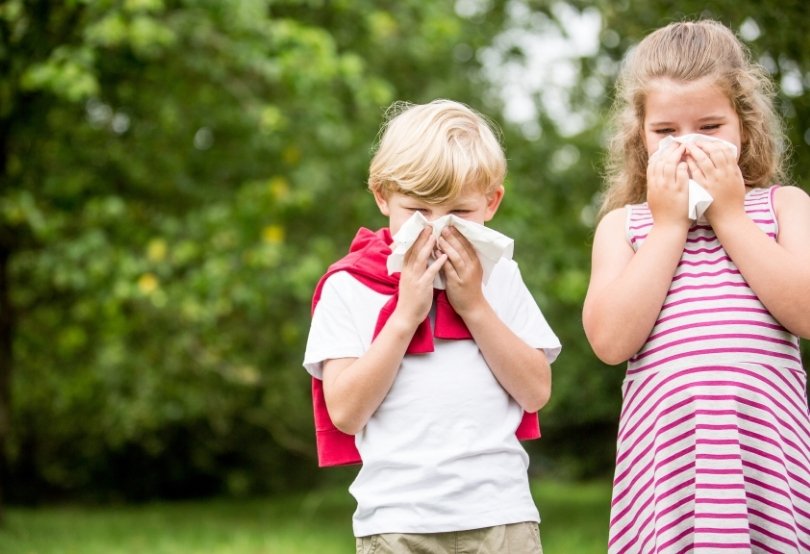
What is Dust Allergy?
Dust allergy is an allergic reaction to tiny particles commonly found in household dust. These particles include dust mites, mold spores, pet dander, and other microscopic substances. Dust mites, which are the most common cause of dust allergies, are tiny creatures that thrive in warm, humid environments and are found in bedding, furniture, and carpets. When individuals with dust allergies inhale dust particles, their immune system reacts by producing antibodies to fight the allergens, leading to a variety of symptoms.
Dust allergies are a form of environmental allergy and can cause symptoms year-round, particularly in indoor environments where dust accumulates. For people with dust allergies, exposure to dust triggers the immune system to release histamine and other chemicals, causing allergic reactions.
Who is Affected by Dust Allergy?
Dust allergies can affect individuals of all ages, but they are more common in people with a family history of allergies, asthma, or eczema. People who are exposed to high levels of dust in their homes or workplaces, such as housekeepers or construction workers, are also at greater risk of developing dust allergies.
Children are particularly susceptible to dust allergies, as their immune systems are still developing and they spend a significant amount of time indoors where dust mites are prevalent. However, adults can also develop dust allergies later in life, especially after repeated exposure to dust over time.
What are the Symptoms of Dust Allergy?
The symptoms of dust allergy can range from mild to severe and may include:
– Sneezing
– Runny or stuffy nose
– Itchy or watery eyes
– Coughing
– Postnasal drip
– Itchy throat or nose
– Wheezing or shortness of breath (asthma symptoms)
– Skin rashes or hives (in some cases)
For individuals with asthma, exposure to dust allergens can trigger asthma attacks, which can cause difficulty breathing, chest tightness, and wheezing.
What are the Risks of Dust Allergy?
Dust allergies can lead to a variety of complications if left untreated. Some of the risks associated with dust allergies include:
– **Chronic Sinusitis:** Persistent inflammation of the sinuses can lead to chronic sinus infections, which may require medical treatment.
– **Asthma Attacks:** People with asthma who are exposed to dust allergens are at increased risk of experiencing severe asthma attacks.
– **Reduced Quality of Life:** Frequent exposure to dust allergens can cause persistent allergy symptoms, leading to fatigue, poor sleep quality, and reduced productivity at work or school.
Managing dust allergy symptoms effectively is essential to preventing these complications and improving overall well-being.
How is Dust Allergy Treated?
The treatment of dust allergies typically involves a combination of medications and lifestyle modifications to reduce exposure to dust and alleviate symptoms. Common treatments include:
1- Antihistamines
Antihistamines are commonly used to relieve sneezing, itching, and runny nose caused by dust allergies. These medications work by blocking the action of histamine, a chemical released during allergic reactions.
2- Nasal Corticosteroids
Nasal corticosteroids are effective in reducing inflammation in the nasal passages and relieving congestion caused by dust allergies. They are often recommended for individuals with persistent symptoms.
3- Decongestants
Decongestants help reduce nasal congestion by narrowing blood vessels in the nasal passages. However, they should not be used for extended periods, as they can cause rebound congestion.
4- Immunotherapy (Allergy Shots)
Immunotherapy involves regular injections of small amounts of the allergen over time to desensitize the immune system. This treatment can be effective in reducing the severity of dust allergy symptoms and may provide long-term relief.
What is Good for Dust Allergy?
In addition to medications, there are several lifestyle changes that can help reduce exposure to dust allergens and alleviate symptoms. Some effective strategies include:
– **Frequent Cleaning:** Regularly vacuuming carpets, rugs, and upholstered furniture can help reduce dust mites and other allergens. Using a vacuum cleaner with a HEPA filter is recommended to trap small particles.
– **Using Allergen-Proof Covers:** Encase pillows, mattresses, and box springs in allergen-proof covers to prevent dust mites from accumulating in bedding.
– **Reducing Humidity:** Keeping indoor humidity levels below 50% can help reduce the growth of dust mites. Using a dehumidifier can be helpful in maintaining a dry environment.
– **Washing Bedding Frequently:** Wash bedding, curtains, and stuffed toys in hot water at least once a week to kill dust mites.
In addition, using air purifiers with HEPA filters can help remove dust and other airborne allergens from the home, providing relief from dust allergy symptoms.
Why Choose Us?
Our clinic specializes in allergies and allergy testing, and we stand out in the field of health tourism with the high standards of service we provide. Here are the key reasons why you should choose us:
Expert Doctor Team
At our clinic, we have highly experienced doctors at the professor level who are experts in the field of allergies. With years of experience in allergy treatment and testing, we provide the most accurate diagnosis and treatment processes. Our professor is skilled in managing even the most complex allergy cases and delivering the most effective solutions.
Cutting-Edge Allergy Tests
Your health is our top priority. In our clinic, we use state-of-the-art allergy testing technologies that are recognized globally. This allows us to obtain the most accurate and rapid results, ensuring that your treatment plans are created in the best possible way. Our tests are conducted according to international standards.
Comfort and Luxury Services
We don’t just focus on treatment; we also aim to provide a comfortable experience. During your treatment, we offer five-star hotel accommodations to ensure you feel at home throughout the process. Your comfort is guaranteed with the luxurious services we provide.
Transfer and Transportation Convenience
For patients coming from abroad or from other cities, we offer VIP transfer services. From the airport to our clinic, and from our clinic to your hotel, we are with you every step of the way. We take care of every detail to ensure your comfort and safety.
Personalized Approach
Every patient’s health condition is unique, and we tailor our solutions to meet each individual’s specific needs. Throughout your treatment process, we stay closely connected with you, and our professional team is by your side every step of the way.






